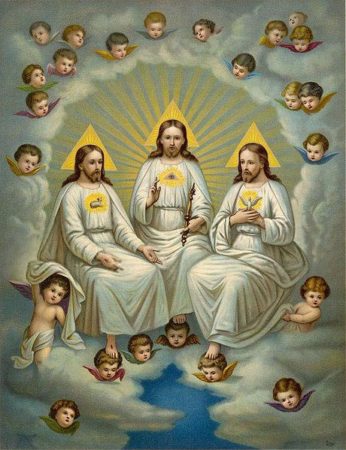
First, I’m happy to observe that
he admits his several disagreements with other much more prominent trinitarians and with central planks of pre-Reformation (and much post-Reformation) trinitarianism. As with many who’ve thought much about this, his views are somewhat idiosyncratic. Just remember that, next time he
poses as the heroic defender of something all Christians (or nearly so) are for.
I don’t classify the Father, Son, and Spirit as “concrete beings“. Since, on my view, God subsists outside of time and space, that’s abstract rather than concrete.
As I (and many) use the term, “abstract” beings are by definition causally inert – they can’t be causes. Hays holds that each of these intentionally act, purposefully cause, so they must be “concrete” and not abstract. And for him, certainly, they are individual beings, not mere properties, events, states of affairs, numbers, sets, concepts, etc. A concrete being, in this sense, may be outside of time and space. (Never mind that Jesus was obviously in both time and space – that’s another post…)
I affirm God’s mereological simplicity in the sense that since that God lacks spatiotemporal parts or subdivisions.
Right. So the “Persons” are in some sense parts or components of the Trinity, but are not parts of it like my body has parts. As you said, “The one God consists of three persons.”
[Dale:] “no scriptural term or phrase was then understood to refer to a multi-personal god.”
When you pour the Bible through a unitarian sieve.
 But how does Hays rebut my charge of tritheism?
But how does Hays rebut my charge of tritheism? This is better summed than quoted. First, he whines that
he didn’t call them “concrete” beings or even “beings.” Then he whines that I’m using less precise words (allegedly) than he did. But of course, his claims
straightforwardly imply that the “Persons” of the Trinity are concrete, as explained above, and that they are so many beings/entities. He had said:
By “person” I mean an individual with a mind or consciousness, and first-person viewpoint. Each member of the Godhead has a first-person viewpoint.
Right – these “members of the Godhead” are thinking, conscious beings. In Cartesian terms, minds or souls, non-physical entities or beings or (as he says) “individuals” which have mind and will, able to intentionally act. Yep – beings! Three powerful realities, the sort I call “selves.”
 Now let’s get more specific. What else are each one of these three beings, in his view? Divine.
Now let’s get more specific. What else are each one of these three beings, in his view? Divine. What is the noun for a “divine being” or “being which is divine.” It is: “god.” Hence, his view is that “the Godhead” are three gods. His reply?
But I said each person is “divine”, not each person is “God” or “a god”. And I defined what I meant by “divine”.
It doesn’t matter, of course, whether tritheist Hays calls them “gods.” His Trinity theory straightforwardly implies that they are. In what sense, in his words, is he calling each of them “divine”?
By “divine” I mean having all the divine attributes.
Right – essential, defining features which any god must have, such as omnipotence and omniscience and eternity and uncreatedness. We get it. Whatever has all the features essential to being a god, is by definition a god.
This is not going well for tritheist Steve!
I’d said, “And presumably, [for Hays] the three differ from one another, so they are not the same god.”His retort: To say they’re not the same god doesn’t mean they’re different gods. Rather, the Trinity is God (in my usage).

If A is a god, and B is a god, and they’re not the same god, yes, it does follow that A and B are different gods.
Now it occurs to tritheist Steve to solve his problem by saying that only the Trinity is a god, so that none of the persons is a god, none of them is fully divine. Our tritheist needs to go back to the drawing-board, it would seem. He’s just denied the third claim in his own summary of his Trinity theory. It does work, to escape the tritheism of this theory, to switch to the view that only the Trinity is a god, though none of the “Persons” is a god. (Like me, then, he’d be denying that there are three fully divine beings.)
For those keeping an eye on the Bible – he’s now in the teeth of the NT, which plainly teaches that the Father is the one true God (i.e. the only god), and so implies that he must have all the features necessary for full divinity. Unfortunately, Hays (if he really commits to this escape), has demoted the Father to somewhat less than full divinity, in order to elevate the Trinity to unique and full divinity.
About my queries/objections about whether or not the Trinity is in his view a self (it must be, to be fully divine – for some divine attributes like omniscience, omnipotence, and omnibenevolence imply being a self), Hays only whines about my terminology. Ridiculously, and without explanation, he asserts that it is a “pseudoproblem” whether or not the Trinity is a self.
Actually, it’s a problem that Hasker has expended great energy on, and to lesser extents, Swinburne and Craig.
Hays hopes that the three gods’ mental access to each others’ minds will somehow help, somehow breaking down the “dichotomy” that separates one mind from another. But still, his scenario of all-around telepathic access is described by him as involving three minds, each had by a different thinking being. So it seems to get nowhere.
In my second post, I offered him an inconsistent triad, inviting him to explain which he denies and why. He declines to give a answer (despite his move above in the direction of denying 3). Instead, he concocts some sci-fi scenarios, and asks how they relate to my structurally parallel triad of claims, about dogs rather than gods.
He doesn’t say what his point is. Is it that he, absurdly, thinks that the three claims could all be true? Or is he trying to argue that we should doubt our judgment that they can’t all be true?

It’d be fun to discuss time travel and “parallel universes” some time, but I think here they’re a distraction from that fact that
our tritheist needs to respond to this inconsistent triad:
- There is only one god.
- Any fully divine being/entity is a god.
- There are three fully divine beings.
As we’ve seen, Hays is a tritheist because he affirms 3, and is committed to 2, as it’s true by definition. This is a failed Trinity theory. Such are supposed to be monotheistic and not also tritheistic – somehow, the Trinity is supposed to amount to a single god, God.
His desire to shift the conversation to sci-fi scenaries shows that he may not realize the weight of my point that the mere structure of these claims renders them such that they can’t all be true. That is why clever speculations will not help. The only thing that would refute my claim would be stating a scenario which appears to be contradiction-free, in which 1, 2, and 3 are simultaneously true.
But the better way is to man up, and
do what I did.
Explain in one paragraph which, according to scripture and sober reasoning, should be denied, and why. If you think scripture is sufficient to address this problem, let’s hear it.
 If tritheist Steve Hays tries to lecture you
If tritheist Steve Hays tries to lecture you on “the doctrine of the Trinity,” or to police your views as heretical or not,
ignore him. As a tritheist, he is not something any trinitarian should aspire to be.
If “the doctrine” is to be understood as monotheistic and not also as tritheistic – then he simply doesn’t know the doctrine.
If he calls you a “heretic,” you can reply “it takes one to know one, my tritheistic friend.” Or you could urge him to repent of his anti-biblical theology, and join the ranks of self-consistent monotheists.
 First, I’m happy to observe that he admits his several disagreements with other much more prominent trinitarians and with central planks of pre-Reformation (and much post-Reformation) trinitarianism. As with many who’ve thought much about this, his views are somewhat idiosyncratic. Just remember that, next time he poses as the heroic defender of something all Christians (or nearly so) are for.
First, I’m happy to observe that he admits his several disagreements with other much more prominent trinitarians and with central planks of pre-Reformation (and much post-Reformation) trinitarianism. As with many who’ve thought much about this, his views are somewhat idiosyncratic. Just remember that, next time he poses as the heroic defender of something all Christians (or nearly so) are for. But how does Hays rebut my charge of tritheism? This is better summed than quoted. First, he whines that he didn’t call them “concrete” beings or even “beings.” Then he whines that I’m using less precise words (allegedly) than he did. But of course, his claims straightforwardly imply that the “Persons” of the Trinity are concrete, as explained above, and that they are so many beings/entities. He had said:
But how does Hays rebut my charge of tritheism? This is better summed than quoted. First, he whines that he didn’t call them “concrete” beings or even “beings.” Then he whines that I’m using less precise words (allegedly) than he did. But of course, his claims straightforwardly imply that the “Persons” of the Trinity are concrete, as explained above, and that they are so many beings/entities. He had said: Now let’s get more specific. What else are each one of these three beings, in his view? Divine. What is the noun for a “divine being” or “being which is divine.” It is: “god.” Hence, his view is that “the Godhead” are three gods. His reply?
Now let’s get more specific. What else are each one of these three beings, in his view? Divine. What is the noun for a “divine being” or “being which is divine.” It is: “god.” Hence, his view is that “the Godhead” are three gods. His reply?
 It’d be fun to discuss time travel and “parallel universes” some time, but I think here they’re a distraction from that fact that our tritheist needs to respond to this inconsistent triad:
It’d be fun to discuss time travel and “parallel universes” some time, but I think here they’re a distraction from that fact that our tritheist needs to respond to this inconsistent triad: If tritheist Steve Hays tries to lecture you on “the doctrine of the Trinity,” or to police your views as heretical or not, ignore him. As a tritheist, he is not something any trinitarian should aspire to be.
If tritheist Steve Hays tries to lecture you on “the doctrine of the Trinity,” or to police your views as heretical or not, ignore him. As a tritheist, he is not something any trinitarian should aspire to be.
Hi Paul – thanks for the comment. In my view, the Logos of John 1 is supposed to be a divine attribute, basically God’s wisdom. God made all through “him,” “he” was the light of the world, “he” came to his own, etc. Wisdom is an attribute that God must have, but it itself is not the sort of thing that could possible be a god, any more than your sense of humor could be a man. If you’re asking about classical Logos theories – they generally do say that the Logos, the second god, has some of the features necessary for divinity – but typically they think it lacks others, such as (before Origen) eternity, or (for any of them) aseity.
Tritheist Hays tries again here: https://triablogue.blogspot.com/2018/05/concrete-beings.html
I started a reply, but I realized it is ALL of his latest long post is (1) insults, (2) carping about terminology, (3) point missing. About (2), repeatedly, he whines that I don’t describe his view in only his words, but he does nothing at all to show that I’ve in any way misinterpreted him.
About his little sci-fi jaunt, I am happy to engage with what we philosophers call “thought experiments.” But it is the job of the one offering the imaginative example to explain what point it is making, or how it is relevant to the debate. Hays, when faced with a hard choice, just said, “Well, what about this?” and went off into sci-fi land, with no explanation of what conclusions we were supposed to draw. So, I took a pass on playing around with his little scenarios.
In this most recent blast, he tells us that the point is that I have “a rigid notion of numerical identity,” that I’m committed to some claims which he thinks he’s providing counter-examples to. Of course, the concept just is what it is. My views on identity are basically what’s taught in any first class in deductive logic. But he’s impervious to tutoring on the topic, I’ve found from many tries. So I must leave him to enjoy his tritheism.
Hi Dale,
I welcome your podcasts which are always interesting and challenging to trinitarians like me.
My imperfect definition of the trinity would be that three persons are one and the same God. The words “person” and “being” carry baggage with them which make it impossible, in my view, to give a perfect definition of God using them.
you said: “For those keeping an eye on the Bible – he’s now in the teeth of the NT, which plainly teaches that the Father is the one true God (i.e. the only god), and so implies that he must have all the features necessary for full divinity.”
Does the Logos have any “features necessary for full (or partial) divinity” in your view?
Why do you speak of the Logos like a Greek metaphysician? You don’t really believe that the Apostle John, a Hebrew, steeped in the Hebrew thought of the OT, was using the word Logos in the Greek metaphysical sense, do you? Maybe he used the Greek word ‘logos’ simply to translate the Hebrew word ‘dabar’, which was used in the OT of either God’s creative word or of His prophetic word of promise. Why muddle up the NT with such confusing jargon and concepts. Let’s just keep it simple.
Comments are closed.